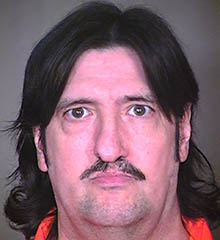Cronkite News has moved to a new home at cronkitenews.azpbs.org. Use this site to search archives from 2011 to May 2015. You can search the new site for current stories.
Supreme Court refuses to hear Arizona’s appeal in death-row case
WASHINGTON – The U.S. Supreme Court on Tuesday rejected Arizona’s appeal of a lower court ruling that a death-row inmate should get a new hearing for his part in a 1989 Tucson murder.
The high court’s denial lets stand a September ruling by the 9th U.S. Circuit Court of Appeals that said David Scott Detrich, 55, should get a chance to argue that he had ineffective counsel at his trial for the murder of Elizabeth Souter.
The Arizona Attorney General’s office did not immediately respond to requests for comment on the Supreme Court’s denial, but an attorney for Detrich was “pleased that the U.S. Supreme Court upheld the decision” of the circuit court.
“This finally will give Mr. Detrich a fair chance to prove previously barred claims that his trial counsel was ineffective,” said Jennifer Bedier, the lead attorney for Detrich. “We look forward to resolving these critical issues.”
Detrich’s case began Nov. 4, 1989, a day when he and a co-worker, Alan Charlton, drank heavily, first in Benson and then in Tucson. They picked up Souter that evening as she walked along a road in Tucson, according to court documents, and asked her where they could find cocaine. They found drugs, and the three went to Souter’s house in Tucson where other people joined them.
But Detrich became enraged when he learned the drugs were bad, according to court documents, and demanded that Souter have sex with him to repay him for the drugs, threatening her with a knife.
Detrich and Charlton then left the house in their car with Souter, court records said. Her body was found two days later in the desert with her throat slit and several stabs wounds.
Charlton pleaded guilty and testified that he was driving when Detrich stabbed Souter. Detrich was first convicted in 1990 of kidnapping and first-degree murder, and sentenced in 1991 him to death. Those convictions were later overturned, but he was convicted again and sentenced in 1995.
In his latest round of appeals, Detrich has argued that his trial attorney was ineffective, which contributed to his conviction and death sentence. But lower courts rejected that argument, saying they were raised after his post-conviction relief proceedings and therefore too late to be considered.
But in a 6-5 decision, the 9th Circuit Court ruled that Detrich deserved a new hearing in district court to determine if ineffective counsel had led to his conviction and death sentence. It cited an intervening Supreme Court case in which the court sided with another Arizona inmate trying to raise an ineffective counsel claim.
“The question is whether, if the evidence that Charlton was the actual killer were stronger – and the evidence against Detrich therefore weaker – Detrich would nonetheless have been sentenced to death,” Circuit Judge William Fletcher wrote in the opinion for the divided court.
In its petition to the Supreme Court, the Attorney General’s office argued that high court review was necessary because the circuit court had failed to demonstrate any showing of prejudice stemming from Detrich’s allegedly ineffective counsel.
“This court should grant review to correct the error and preserve the well-established requirements that petitioners must meet to demonstrate ineffective assistance of counsel,” the state’s petition said.
But the Supreme Court declined Tuesday, without comment, to hear the appeal.







